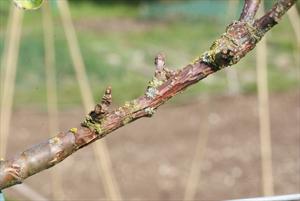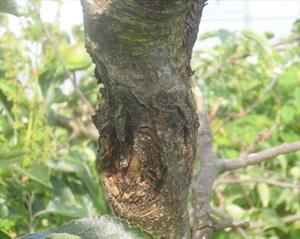 Canker on a young shoot
Canker on a young shootCanker is one of the most serious diseases of fruit trees, especially apple trees.
In the case of apple trees and pear trees it is usually caused by a fungal infection, and may be more prevalent in wetter temperate climates. The infection enters through damaged shoots, the temporary wounds left when leaves fall in autumn, and damaged areas of stems and shoots caused by other diseases.
Cankers in plum and cherry trees are very similar in appearance and result, but are caused by a bacterial agent rather than fungal spores.
Resistant and susceptible apple varieties
 Canker on the trunk of a mature apple tree
Canker on the trunk of a mature apple treeCankers are not particularly common, and as described below, prompt action will usually fix the problem so it is not always necessary to plant disease-resistant varieties. However if you are in a mild wet climate or there are cankers in trees in surrounding gardens then a resistant variety is worth considering - but note that "disease-resistant" does not mean "disease-proof".
Apple varieties which have some resistance to canker.
Apple varieties which are susceptible to canker.
Treatment
When treating canker it is important to realise the life of the tree is under threat, and drastic action is therefore justified. Cankers may seem to spread quickly and then slow-up as the tree resists, perhaps over several years, but in the long-term the tree is very unlikely to survive.
The immediate objective of treatment is to prevent the infection spreading down into the main stem of the tree, as this will be fatal.
When you see a canker cut back the infected branch or shoot until fresh green wood is visible. Don't wait until the "correct" pruning time of the year, act immediately. If the canker is extensive, be prepared to remove major limbs from the tree.
Remember that not only can prompt action help save the infected tree, but also prevent the infection spreading to nearby trees.
Since canker is endemic in most areas it is impossible to prevent re-infection. However the fungal spores are most active in late autumn, a time when many trees are losing their leaves and may have open wounds which the spores can infect. Therefore try to avoid pruning at this time of year. This is also the usual time of year to apple fungicides such as Bordeaux Mixture to control attacks. Bordeaux Mixture is approved for most organic regimes.
See also bacterial canker - a similar infection of plum and cherry trees.
